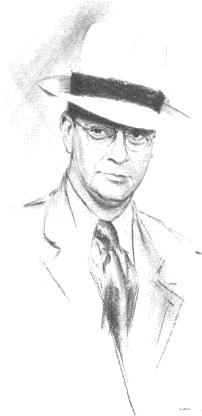 AUDIO PRESENTATION
AUDIO PRESENTATION  AUDIO PRESENTATION
AUDIO PRESENTATION
THE SOUTH IN A CHANGING WORLD
Commencement
Address by W. J. Cash - June 2, 1941
at the University of Texas,
Austin
(Text Included Below)
Speech Length: 27:06
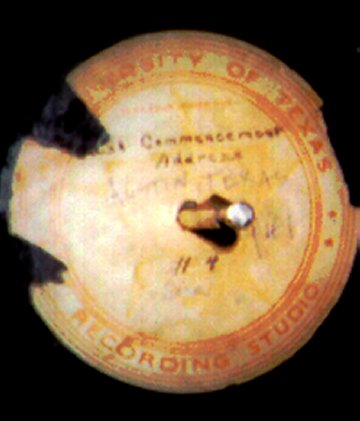
Commencement Address Player Link
Commencement Address Player Link (retouched version*)
|
To start the speech, first obtain and install the free player from http://www.real.com/. Then simply click on the link above or on the record label thumbnail at the start of the speech text below. The speech will start almost immediately after the loading of the RealAudioŽ Player. The best sound is achieved by playing recording through headphones or external speakers. *Because the flavor of the original recordings and, to some degree, the tenor of Cash's voice on these recordings, are more accurately captured in an unretouched audio file, we have included two versions of the RealAudio, one being a simple digitally transcribed tape recording of the original 78 r.p.m. records, replete with bumps and crackles one might expect from recordings of that vintage, the other, cleaned up via digital software. Thus, try both and suit your ears as you will. (Computers operating at 166mhz and below, especially laptops, may experience time-out problems excessively on the RealPlayer network; if so, it is recommended that you download the Yamaha player and listen to the speech through the Yamaha audio links (in two parts).) |
Go
to Text of Speech
(or scroll down to Text at Record Label
Thumbnail Image)
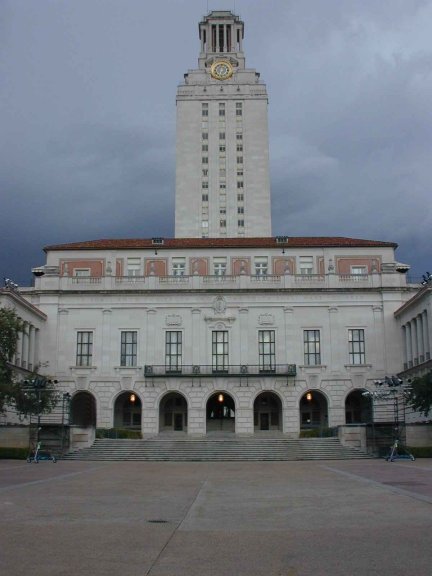
The Main Building south steps where Cash spoke beneath the words,
"Ye Shall Know the Truth and the Truth Shall Make You Free".
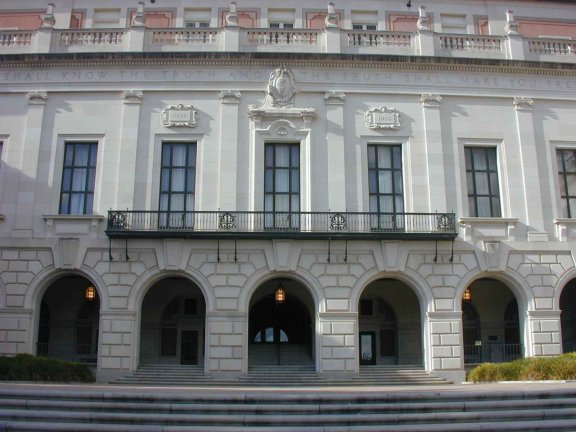
"The moon shone brightly and the tower burned orange Monday night as 1,339 students sat in front of the Main Building to receive their University degrees and to be told that as Southerners they must mix clear-headed common sense with their traditional courage and pride.
"The advice was given by commencement speaker W. J. Cash ... whose subject was 'The South in a Changing World.'
"Declaring that in the days ahead 'we shall need the humility to examine ourselves quietly and the will to cut through our problems,' Cash warned that since the Civil War the South has exhibited a tendency to set up a wall of idealism, romanticism, and of refusal to face the unpleasant.
"Mr. Cash, whose speaking ability does not equal his writing talent, declared that the South's idealism and romanticism had produced a mental boycott that at times quarantined at the Potomac and Ohio the stream of ideas passing through the world. Southern schools were crippled by the spirit for decades, he said.
"'It is a great rich land, this South,' he said. 'In Texas alone there are more potential riches than in the continent of Europe. Here, if anywhere, in Texas and in the South, man should be able to create a good society.'"
--As reported in The Summer Texan, (University of Texas student newspaper), Thursday, June 5, 1941. From whence most of this quoted material came, the original prepared text of the speech--which Cash only paraphrased--or from the student reporter's less than precise gleanings, is not clear. But in the spoken version Cash neither stated the first attributed quote regarding the need for humility and the South's hiding behind a "wall of idealism" producing a "mental boycott" which "quarantined at the Potomac and Ohio the stream of ideas" nor anything resembling the last sentence of the last quote regarding the creation of a "good society". It is, however, noteworthy that the utterance of this latter phrase would have foreshadowed (and perhaps did) the quarter century later "Great Society" programs spirited through Congress by a larger-than-life Texan who was when this speech was delivered in June, 1941 making his first bid for the United States Senate.
W. J. Cash was not fond of public speaking; he was a reticent, even reclusive, studious sort. When asked to speak in front of more than four people, his throat would tighten and he would often stammer and cough uncontrollably, noticeably blushing in the process. This was one of several speaking engagements to which he was invited in the wake of publication of The Mind of the South four months earlier. Homer P. Rainey, the president of the University of Texas, who for his progressive views would be dismissed by the University regents just three years later, had invited Cash on April 24, 1941, telling him, "I have been talking to the people of the State a great deal along the lines of your thesis and have been trying to encourage here a type of thinking about our problems similar to that which the group at the University of North Carolina under Dr. Odum's leadership has done." (Source: W.J. Cash: A Life, Bruce Clayton, L.S.U. Press, 1991, p. 180 from letter to Cash from Rainey in Elkins Family Scrapbook) Cash could use the $200 honorarium offered; and since the trip to Austin required only slight deviation from the planned train trip to Mexico, just at a time when he and Mary planned to be on the journey, it fit perfectly.
Cash had spoken on May 3 to a group of high school student journalists at the Scholastic Press Institute in Chapel Hill at the invitation of Walter Spearman, a former Charlotte News colleague of Cash and future dean of the School of Journalism at the University of North Carolina. Cash's first biographer, Joseph L. Morrison, was in attendance at this presentation as a recent graduate and describes the episode at the beginning of his book on Cash: "I saw W.J. Cash once, and at that time he was talking his heart out about editorial integrity... The largish, bald, bespectacled man impressed me deeply--as did his book, when I got around to reading it after doffing a World War II uniform." (Southern Prophet, p. vii)
Cash's recent practice of elocution is evident in his last public address; he only occasionally stammers, never coughs, and effects a melodious delivery almost worthy of H.V. Kaltenborn. Looking from the steps of the Main Building toward the brightly lit State Capitol of Texas, Cash delivered the 28 minute speech to a graduating class of 1,339 white students and a total audience estimated at 10,000. (Like virtually all Southern colleges and universities of the time, Texas was still segregated and would remain so until the Supreme Court ruled in 1950 in the case of Sweatt v. Painter that the University must admit an African-American student to the law school because the one all-black law school in the state was found by the Court to be substantially unequal in available resources and thus violative of the old Plessy v. Ferguson "separate-but-equal" requirement for segregated public facilities--the standard foredone by this case and finally completely overturned in 1954 in Brown v. Board of Education. Thurgood Marshall, who in 1967 became the first African-American to be appointed to the U.S. Supreme Court, was lead counsel for the petitioners in both Brown and Painter.)
It was thought that down the street from the Capitol might meander, to be among the honored guests of the University, old-guard governor of Texas, "Pass-the-Biscuits" Pappy O' Daniel; but former flour salesman Pappy, often editorialized as a buffoon by Cash and the Charlotte News, left with his "hillbilly band" for Waco on the morning preceding the commencement to begin campaigning in the special election for the United States Senate to replace recently deceased Morris Sheppard whose unexpired term had one year remaining. On June 28, Pappy, by less than 1000 votes, managed victory in the race over a young, popular Congressman, Lyndon Johnson, making his first run for high office and his last unsuccessful bid for same. Martin Dies, House Un-American Activities Committee Chairman and also a favorite editorial target of Cash and the News, was in the race as well but finished a distant fourth. On this June 2 commencement day, Johnson, while campaigning a hundred miles away from Austin in El Campo, had called his older opponents "greenhorns" who hadn't the experience to get the job done in the troubled times ahead; the strategy worked. He held a lead of some 4,000 votes after the initial counts on June 29, but finally fell behind with the discovery in some counties of "lost votes" heavily favoring Pappy. Additionally, several thousand votes in Johnson-carried counties were thrown out because of improper marking of a confusing ballot requiring all except the selected candidate to be crossed off. (By the turn of the century we had come a very long way since those bad old days--and blessed be us for it, too.) Pappy was declared the winner on June 30.
With or without Biscuits, the ceremony began on time at 7:45 on a sweltering Texas evening. Cash laid aside the prepared text of the speech (see footnote 1) and chose instead to extemporize from an outline. He found it easier on his nerves than trying to remember a particular script.
The resulting speech provides a useful outline for understanding Cash's main themes in The Mind of the South and thus has more significance to the student of Cash than ordinary memorabilia. He begins with an intriguing segue from a "short, incidental section" on the Alamo, contained within a best-selling wartime novel of the time, Delilah, by San Antonio native Marcus Goodrich, to talk of Texas and its integral character with the South in general, quickly pulling his audience with common drawstrings into familiar trappings as "true Southerners" so that he could then comfortably converse with them about the South's sins and failings and its "vices of unreality and oversentimentalization" and its need for growth from this pattern to the future. As he continued to speak, an eerily poetic train whistle in the distance, (which can be heard if you listen carefully around the point where Cash says, "That tendency to unreality, to romanticism and sentimentality, was its most striking trait, I think..."), seemed to beckon him to conclusion and the vast unknown of Mexico. He ends with a caveat regarding the encroaching totalitarianism in Europe and its portent for the nation and the South; then finally delivers a cryptic sideswipe at both Hitler and some still mired-in-the-past Southerners--"that man after all is a social creature and that none of us has the right to stand outside the social organism."
The speech should be heard with a careful ear of someone listening to a poem
or a song. Interest in Cash's book survives today because of his
ability to compose art within the confines of scholastic
discourse and, by that, say sub silentio more
than on the printed page; no less is the case in his delivery of
this "critical speech" on June 2, 1941, 29 days before
he was found by his wife hanging by his necktie in La Reforma
Hotel in Mexico City.
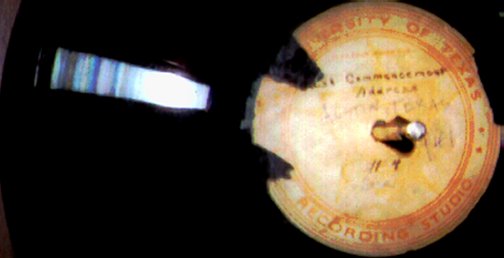
Seven sides of four 78 r.p.m. records which play backwards, from "inside out" as the label instructs, (with no hidden cinatas segassem so far as ew nac llet) comprise the original set of recordings of this speech, made by the University of Texas "Lone Star" Studios and delivered posthumously to Mary Cash on December 13, 1941. The identical set from which the recordings at this site were made were presented to Cash's sister, Bertie Cash Elkins, at around the same time. The original records are in remarkably good condition, though inevitably, being made of glass, occasionally contain variations, skips, and pops characteristic of such vintage 78's. (To hear a reel-to-reel tape of these records made in 1965, visit the Southern Historical Collection of the Library of the University of North Carolina.) During the transcription first to audio tape and then to digital format (finally compressed by a factor of 250:3), every effort was made to filter as much of this surface noise out as possible while preserving the original sound. As the producers of Woodstock stated, try to regard the flaws as the scars in fine leather--increase, not chaff. (At one point, ten minutes into the speech, you will hear Cash appear to hiccup. Don't blame Cash or this site's transcription; it is wire slippage on the original wire recorder (as magnetic tape had not yet come into usage) which occurred in the original transcription to record in 1941.) Most of the resulting digital transfer, however, brings Cash's speech to presence with little to interfere with the imagination's inevitable response to the particularly precipitous time when it was delivered, just 20 days before the German armored and infantry divisions would plow into Russia, expanding the war and hastening talk in Congress of America's official entry; 28 days before the largest spy bust in American history would net 33 Nazi spies in and around New York City; and just six months before America would be forced into the war by sneak attack at Pearl Harbor. Meanwhile, Cash, armed with virulent hatred for the Nazi mentality and its leader, "the little rat-like man leaning on the balustrade" overlooking the Tomb of Napoleon, (as Cash had called him in a News article published precisely one year before his own death), was on a brief stopover in Austin for a graduation address, while hurling himself headlong, on his way to Mexico City with his wife of five months, to write a novel on one "Andrew Bates", never to be begun, and to a fate as yet fully determined.
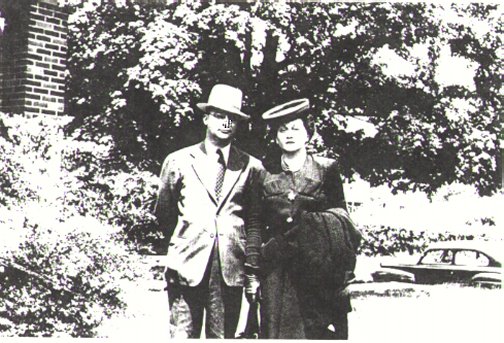
Front and back of postcard sent from Mary to in-laws Cash, postmarked at 1:30 p.m., June 2, 1941, about six hours before the speech. It reads: "We did see the bones of one shorthorn, but nothing like the fellow in the picture. Thousands on thousands of cows & billions of trees in what we had thought would be desert. Boy has a fine speech. Mary" This is one of two pieces of correspondence from Wilbur or Mary to anyone within the Cash family before his death four weeks later. (See the last letter from Cash to his parents in the Picture Gallery, 1941, page 3, at this site)
|
But I do not speak of the Alamo merely to pay tribute to Texas and Texans, but to emphasize of course that it is the primary tradition of Texas and so is in some ultimate sense also the tradition of the whole South: The people who came to—the people who settled Texas—came from all of the states in the Union, of course, as it existed at that time. They also came from many foreign lands, and I have no desire at all to detract from the credit of any of them; but ultimately, Texans were mainly drawn from the stock of the older Southern states, and the tradition of Texas is therefore the tradition of the older South, the tradition that was already formed and was different from the prevailing American tradition in a great many respects at the time these people began to arrive in Texas. I emphasize tradition here because tradition is very important in the world in which we live at present, the world into which the Class of 1941 will be going forth. Totalitarianism is apparently sweeping over the world. It certainly swept over Europe and is at the present threatening the United States. Well, there are people who tell you that it’s an irresistible wave--men and women in the United States--who say that the only rational thing for us to do is to give up quietly, that we are seeing the decay and death of an order of civilization. Well, for my part, I shall not believe that till I see it proved. I shall remember the history of the Alamo and of my country, and believe that it will survive. When that is said, however, it is necessary to fix in mind very firmly that the world into which we are going is certainly going to be a very different one from the world which we have known in the recent past, the world in which the Class of 1941 will live, which will shape its lives and destinies and also the life and destiny of the United States, of the South, and of Texas. That being the case, and since tradition is everywhere under attack--since the whole tradition of the Western world is under attack, and our tradition in the South of course is ultimately just a part of that tradition of the Western world--I think it is very necessary that we should try not only to approach the problems of the times that are coming with good will, but also with as intelligent as possible an understanding of what our tradition is. Now, as I say, the whole tradition of the Western world is actually involved. Well, the limitations of time don’t allow me to go into all that here this evening. What I am concerned with is the tradition of the South with Texas bound into that tradition as an integral part of it. Well, what then is our Southern tradition? The best way to answer that I believe is to remember who we were and are, what we were in our origins. The answer to that is that we were a plain people in general in our origins. John Bright used to like to talk about the poor, proud homes of England. Well, if you add the poor, proud homes of Scotland and Ireland and France and Germany, perhaps, Spain now and then, why you probably have just about where most of us came from. Of course there’s the tradition of the Southern aristocrat. We’ve all heard of them all our lives and a great many of us even now and then claim to be descended from them. Well who were they? The answer is that we created to a certain extent our own aristocrats. The people in Virginia and lower South Carolina, the people around New Orleans, up the Mississippi Valley to some extent, were there a long while before the mass of immigrants got into this country and they had time enough, some of them, to grow into aristocrats, but to start with they were undoubtedly mainly simple people of the same sort as the rest of us. The greatest planter in Norfolk, for example, the Norfolk area, was Adam Thoroughgood, and he came into the colony as an indentured servant. Another one--a famous family up there which I need not name here, [ed. note: the family was that of William Randolph, c. 1651-1711] the founder of the family paid his passage across the sea as a ship’s carpenter. Well, I instance these cases merely by way of insisting on the primary simplicity of our origins. A few of the people who came to this country, of course, actually did belong to families of considerable rank in England, in Scotland, Ireland— anyhow, in Europe. But that was the exception and not the rule. But that still leaves the question of how the notion of aristocracy got so widely established in the South. In part, I think, it’s explained by the rapid acquisition of land and slaves by a great many people who had been poor and plain up until after the invention of the cotton gin. The plantation system, of course, was carried over the South by cotton, and the growing of cotton became profitable on a wide scale only after the invention of the gin. Well, these people who had acquired land and slaves naturally imitated the wealthier people of Virginia and South Carolina, in particular, sometimes Louisiana, New Orleans. But there is more to it than that, I think. We come now to what seems to me to be one of the most important things to understand about the South, that it has been from the invention of the—from the beginning of the fight over slavery, a society on the defensive. It was on the defensive because it had a guilt complex about slavery. The South was settled not only by Christian people—but mainly by Protestants and they brought over with them the great dislike of slavery which has always distinguished Calvinism. In the early days of the Abolition movement, the antislavery cause actually won more support in the South than it did anywhere else in the American colonies, the American nation. But the South had a self-interest in slavery and didn’t want to give it up. Now you notice that I say the South had a self-interest in slavery and not merely the slave owners. The introduction of Negro slavery over the South generally had brought in the notion of racial superiority. And though slavery involved a great deal of hardship—economic hardship—and disadvantage for white people who did not own slaves, it was always pretty well balanced out by that feeling of racial superiority plus a more or less conscious protection from the danger of competition, economic competition, which the Negro, if he were freed, would bring on. So we find that reading a book like Hinton Helper’s Impending Crisis of the South, written in 1856, I believe, or ‘57, [ed. note: the date was 1857] we find that the masses of white men were quite often even more determined not to let the Negro escape from slavery than the plantation owners—owners of slaves. That brings us back to aristocracy. You see, for the South to paint itself as an aristocratic society was to say that it was a superior society, and it set up this doctrine that it was an aristocratic society undoubtedly as an answer to the Yankee’s--the North’s--moral superiority over slavery. And so we have in the Old South a society arising from originally plain, proud, poor people, to the growth of the plantation and typically the cotton plantation. Some of them by the time of the Civil War were genuinely aristocrats. Others were on the way to being such. But the great majority, even of the ruling orders, were not aristocrats. Yet the claim to such rank was virtually coexistent with ruling orders and often reached down below them, because the Old South was in the last analysis a society which stood on the defensive. Torn between two powerful impulses—moral disapproval of slavery on the one hand and powerful self-interest, economic self-interest, on the other—the South had begun to retreat into unreality, to romanticize and sentimentalize itself and its peculiar institution. That tendency to unreality, to romanticism and sentimentality, was its most striking trait, I think. It extended through the whole of Southern life and impressed every part including religion and morality. By the time the Civil War came on, the best brains of the South were preoccupying themselves with such futile projects as trying to prove by the Bible that God had ordained the Negro to be the slave of the white man. [Ed. note: see, e.g., Scriptural and Statistical Arguments in Favor of Slavery by Thornton Stringfellow; and Nellie Norton: Or Southern Slavery and the Bible, by Ebenezer W. Warren] And while the ruling—while the official ruling Southern moral code was that of Puritanism, the conduct of many of those who professed that code was often anything else but puritanical. Mind you, I am not accusing the Old South of hypocrisy. Hypocrisy is a coolly calculated, conscious thing, and the South was not consciously engaged in double dealing. Merely it was responding to a situation which it found impossible to face, precisely as any other people would have responded, by retreating toward unreality. But of course the Old South had other qualities besides this one I name of unreality and tendencies to romanticism and sentimentality. Many of them cannot be mentioned here because of the limitations of time. But one of them deserves special notice: I mean the characteristic of extreme individualism. This quality had extremely deep roots. The effect of the survival of the tradition of the frontier is obvious and I shall not labor it here. But it also has to be noted that most Southern white men retained some sort of land, this land absorbed naturally by the plantation. But lands that were good for the growing of corn for food and for a little cotton for clothing were pretty well universally possessed by Southern white men. And that's to say, of course, that they retained their independence, and independence is naturally the soil in which you get extreme individualism. With that background, we come to the great disaster of the Civil War and Reconstruction. The march of the Old South towards an aristocracy was ended, towards a plantation aristocracy was ended. So was slavery. But for the old proud sore defensiveness in attitude which we had before the War, we now had added--we now had a much more developed sort of thing, the sensitiveness of a defeated people. If slavery was gone--in the North, well-meaning and not so well-meaning men were demanding that the Negro should suddenly acquire not only equal rights with white men, but often even superior rights. To that the South responded as any other people would have responded, given the same tradition and the same environment. Often that response was violent and brutal. And so much was to be expected from them, from men with a long tradition of the frontier behind them. The South had always been violent. It was violent before the Civil War. Lynching and the duel both flourished there as it flourished nowhere else in America. But let us understand in saying that that we are simply trying to understand something, not to pass moral judgment. Faced with the same problem, given the same environment and background, the North would have responded very much as we did in the South. The violence, of course, is incidental. What I want to emphasize most is that the South’s tendency to reality [sic]—to unreality, to romanticism, to sentimentality, was enormously reinforced by the Civil War and Reconstruction. If the movement toward the plantation aristocracy was ended, if even the people who had already achieved aristocracy were more or less being extinguished--yet in this period the South would accept such a notion of aristocracy in the Old South with far greater vigor than ever before--again as an obvious defense mechanism against the Yankees. The idealization and sentimentalization of the past is of course a normal enough thing for defeated peoples, and so is fierce defensiveness in general. Ireland is a good example, and our Southern literature of the Thomas Nelson Page era, with the Marse Chans and Squire Effinghams, has its parallel in the literature of any of those nations which have been defeated, Ireland or Poland, name them as you please. [ed. note: Cash may say, or mean to say, here, "Marse Chans and Squire Effinghams" as it is written in Mind, p. 124 (Book II, Chapter 1, section 8--see footnote 2 below for quote); but the actual words uttered could be interpreted as "Marse Chans and scribes and Hams". In such an understanding the "scribe"would be an apparent reference to the first person narrative of Page's "Marse Chan", written from the point of view of a passerby to a plantation who comes upon a slave who tells him glowingly of "Marse [Master] Chan" in a dialect set precisely to print by the "scribe" in a plainly racist and condescending manner. "Ham" is another slave, Marse's buggy driver, described by the slave as someone whom Marse Chan has heroically saved from a fire.] In itself, the idealization of the Old South as a country full of dueling gentlemen and ladies in farthingales might not be important. What is important is that the tendency to unreality which is summed up in this attitude extended to all fields of thought and so had the greatest consequences. Patriotism to the ideas of the South had always been an integral part of Southern defensiveness. Probably it had more to do with the South’s pugnacity before the Yankee than slavery itself. [But now it was enormously expanded. Everything that was Southern became sacrosanct, immune to criticism, an object for pride. Everything that was not Southern became anathema, at least suspect.] [ed. note: Decay of original records prevented bracketed section from being transferred to tape.] The result of that was that before long these people who had always had land before the Civil War, who had had their independence, found themselves being sold out and reduced to the status of sharecroppers, white tenants, in order to make a living--of course on the terms that were available, and those terms were fixed by the Negro’s competition. But not even the white man’s status of white tenant and sharecropper made him safe from the competition of the Negro. Numbers were so great till it soon became apparent that we were going to have open conflict, and that is fundamentally the reason that the South turned to industrialism. I say that this is fundamentally the reason. I understand of course that the desire of the early entrepreneurs for profit played a very great part in the industrialization, the rise of industrialization in the South in the 1880’s to 1900 and afterward. But there certainly was also this patriotic motive of providing a sanctuary for the masses of white men. The organization of new cotton mills, factories of any sort in the South, in those early years was often a communal project. In fact, as late as the war period, and in the early 1920’s, that was still true to some extent. And the man who built a cotton mill, who organized it and led the enterprise, was looked upon as very definitely a community benefactor. And he was, of course. He felt that himself, and the people granted him that it was a great public benefaction. But as time went on, it was no longer necessary to make the sacrifices which had been made in the beginning. Low wages and long hours, child labor probably, were necessary, at least semi-necessary, conditions for the early growth of industrialism in the South, because it had little capital. And the extent to which Northern capital was willing to aid has been greatly exaggerated. It had positively to lift itself by its own bootstraps and to do that, for one thing, they made very cheap products also. To make enough profit on the processing of cheap cotton goods, it was necessary to have low wages, long hours, and so on. But time passed and it was no longer so necessary. With this attitude, you see that old unreality, the desire to believe what you like to believe, coming back in there. The man who built a cotton mill still thought himself to be a public benefactor whether or not he was actually doing anything but pursuing his own personal ends. And the attitude of the people remained.Well, that is the explanation, I think, of the enormous hostility that has been shown in the South toward the labor union idea. It was somehow an attack on what we call "Progress", and so an attack against the integrity of the South, the South’s right to defend itself in the world. [ed. note: See The Mind of the South, Index, "Progress" and references noted therein for further understanding of the term, i.e. the notion of the renewed ideal of self-determination, supplanting the old plantation system, through the advent of cotton mills and industry, a "sanctuary for common whites" in the South after the Civil War into the 1920's.] Now this has been a deliberately critical speech. I haven’t tried to cover the whole history of the development of the South. You can’t do that in one volume, as I found out. It would take a dozen. But what I have tried to do is to suggest some of the main lines of our development and some of the things that it seems to me most important for us to know--to take into account. This is a very great rich land--this Southern country of ours. Texas alone, I believe, has greater resources than all of Europe. Certainly the South is the richest comparable area in the world. Yet we face now a need for renewed sacrifices. As the country moves into the national defense program and we prepare to try to resist totalitarianism, we're going to have to make up our minds there are hardships; but I see no reason at all why we should make up our minds to more hardships, more sacrifices than are necessary under the circumstances. And it's for that reason that I made this critical speech in which I point out what seem to me to be the vice of unreality, of romanticism, excessive romanticism and excessive sentimentality. I have no desire to attempt to stamp sentiment out of the world. We have had too much of that recently in Europe. But "sentimentality" is a false sentiment which exists for the purpose of hiding something, for dodging something, and it is a very dangerous vice in the South now. Now, as far as individualism goes, why it can be a great virtue, just as the pride that goes with it can be a great virtue, but it can also be very dangerous if it isn’t kept in check by the realization that man after all is a social creature and that none of us has the right to stand outside the social organism. Thank you. A speech recorded backwards, transcribed forward: Perhaps, as it were, the proof of the negative...
|
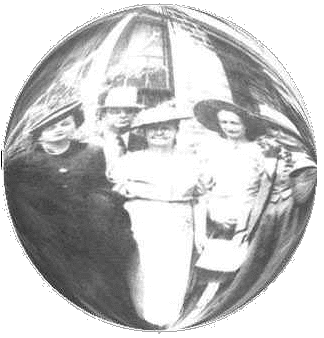
"We are
no more than a moving row of magic shadow-shapes that come and go."
--The Rubaiyat
Hyperbolized alteration of last photo ever taken of Cash with his family, l. to r., wife Mary, Wilbur, mother Nannie, sister Bertie, father John W. (Original photo taken by brother-in-law Charles H. Elkins on Cash's last Sunday in Shelby, beside family home at corner of Morgan and Sumter Streets, May 25, 1941) Cash was buried six weeks later, two blocks away in Sunset Cemetery. The quoted phrase was used, substituting "fantastic" for "magic shadow", to introduce Cash's first short-lived weekly column for The Charlotte News in 1928, titled "The Moving Row". |
Thanks are due the late Professor Joseph L. Morrison for the transcription of the speech as it appears in W.J. Cash: Southern Prophet, Knopf, 1967, (with some minor corrections made above to comport with the actual speech and to enable easier reading in text form). The sketch of Cash appearing at the top of this page is by Manuel Domecq, 1991; the original hangs in the North Carolina room of the Wake Forest University Library. (Reprinted from W.J. Cash and The Minds of the South, ed. by Paul D. Escott, L.S.U. Press, 1992)
1 We have endeavored to find a copy of the original text of the speech but have been unable to do so in examination of both Professor Morrison's papers at the Southern Historical Collection of the University of North Carolina and Cash papers held at the Harry Ransom Research Center at the University of Texas. Professor Morrison's comment in Southern Prophet at page 124 that the Dallas Morning News and the Austin Statesman contained text of the original speech appears in error as examination of both newspapers, as well as the University student newspaper turned up no such text, though all three newspapers carried stories about the commencement address.
2 The paragraph of The Mind of the South in which Cash makes reference regarding "Marse Chans and Squire Effinghams" reads as follows: "It was in this period that the legend of the Old South finally emerged and fully took on the form in which we know it today. With the antebellum world removed to the realm of retrospect, the shackles of reality, as so often happens in such cases, fell away from it altogether. Perpetually suspended in the great haze of memory, it hung, as it were, poised, somewhere between earth and sky, colossal, shining, and incomparably lovely--a Cloud-Cuckoo-Land wherein at last everybody who had ever laid claim to the title of planter would be metamorphosed with swift precision, beyond any lingering shade of doubt, into the breathing image of Marse Chan and Squire Effingham, and wherein life would move always in stately and noble measure through scenery out of Watteau." (Mind, Book II, Chapter 1, section 8, p. 124 of 1991 ed.)(See In Ole Virginia, or Marse Chans and Other Stories, by Thomas Nelson Page)